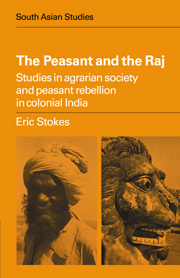Book contents
- Frontmatter
- Contents
- List of Maps
- Preface
- Introduction
- 1 The first century of British colonial rule: social revolution or social stagnation?
- 2 Privileged land tenure in village India in the early nineteenth century
- 3 Agrarian society and the Pax Britannica in northern India in the early nineteenth century
- 4 The land revenue systems of the North-Western Provinces and Bombay Deccan 1830–80: ideology and the official mind
- 5 Traditional resistance movements and Afro-Asian nationalism: the context of the 1857 Mutiny Rebellion
- 6 Nawab Walidad Khan and the 1857 Struggle in the Bulandshahr district
- 7 Rural revolt in the Great Rebellion of 1857 in India: a study of the Saharanpur and Muzaffarnagar districts
- 8 Traditional elites in the Great Rebellion of 1857: some aspects of rural revolt in the upper and central Doab
- 9 The structure of landholding in Uttar Pradesh 1860–1948
- 10 Dynamism and enervation in North Indian agriculture: the historical dimension
- 11 Peasants, moneylenders and colonial rule: an excursion into Central India
- 12 The return of the peasant to South Asian history
- Glossary
- Index
3 - Agrarian society and the Pax Britannica in northern India in the early nineteenth century
Published online by Cambridge University Press: 20 October 2009
- Frontmatter
- Contents
- List of Maps
- Preface
- Introduction
- 1 The first century of British colonial rule: social revolution or social stagnation?
- 2 Privileged land tenure in village India in the early nineteenth century
- 3 Agrarian society and the Pax Britannica in northern India in the early nineteenth century
- 4 The land revenue systems of the North-Western Provinces and Bombay Deccan 1830–80: ideology and the official mind
- 5 Traditional resistance movements and Afro-Asian nationalism: the context of the 1857 Mutiny Rebellion
- 6 Nawab Walidad Khan and the 1857 Struggle in the Bulandshahr district
- 7 Rural revolt in the Great Rebellion of 1857 in India: a study of the Saharanpur and Muzaffarnagar districts
- 8 Traditional elites in the Great Rebellion of 1857: some aspects of rural revolt in the upper and central Doab
- 9 The structure of landholding in Uttar Pradesh 1860–1948
- 10 Dynamism and enervation in North Indian agriculture: the historical dimension
- 11 Peasants, moneylenders and colonial rule: an excursion into Central India
- 12 The return of the peasant to South Asian history
- Glossary
- Index
Summary
It has been customary to view the effects of the British annexation of the Ceded and Conquered Provinces (1801–3) in terms of an abrupt caesura. Upon the whirling anarchy of the North Indian scene there suddenly fell the Pax Britannica. A political revolution was worked almost overnight. The tide of Sikh expansion was checked and turned back, Jat power penned in Bharatpur, Sindhia driven across the Chambal to his matchless rock citadel at Gwalior, and the Oudh nawabi stripped of its Doab, Rohilk-hand and eastern districts. The second line of the political elite could not long survive this dismantling of the superior political structure. Although, at first, expediency impelled the use of large-scale intermediaries, the assertiveness of British rule and its hunger for revenue could tolerate no more than could the Mughals the existence of tall poppies along the principal strategic highway of its power between Benares and Delhi; and on their part the number of magnates capable of keeping their footing and making the rapid adjustment from warlordism to estate management were few indeed. Within two decades of 1801 a large proportion of the established magnates had been swept from the scene, and the remainder were finding that the sun of official favour had gone down while it was yet day.
- Type
- Chapter
- Information
- The Peasant and the RajStudies in Agrarian Society and Peasant Rebellion in Colonial India, pp. 63 - 89Publisher: Cambridge University PressPrint publication year: 1978



